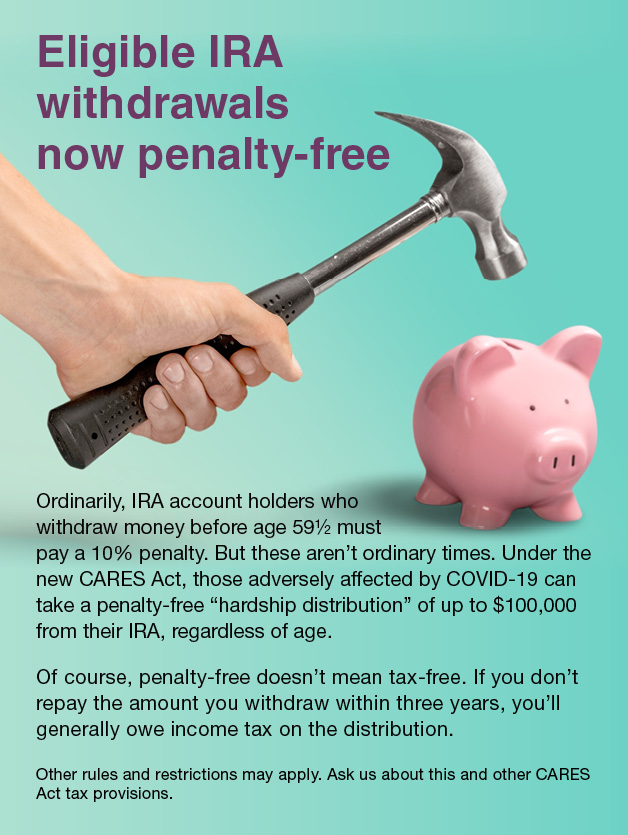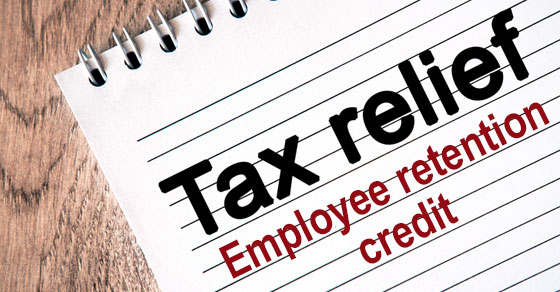
The IRS has issued guidance providing relief from failure to make employment tax deposits for employers that are entitled to the refundable tax credits provided under two laws passed in response to the coronavirus (COVID-19) pandemic. The two laws are the Families First Coronavirus Response Act, which was signed on March 18, 2020, and the Coronavirus Aid, Relief, and Economic Security Act (CARES) Act, which was signed on March 27, 2020.
Employment tax penalty basics
The tax code imposes a penalty for any failure to deposit amounts as required on the date prescribed, unless such failure is due to reasonable cause rather than willful neglect.
An employer’s failure to deposit certain federal employment taxes, including deposits of withheld income taxes and taxes under the Federal Insurance Contributions Act (FICA) is generally subject to a penalty.
COVID-19 relief credits
Employers paying qualified sick leave wages and qualified family leave wages required by the Families First Act, as well as qualified health plan expenses allocable to qualified leave wages, are eligible for refundable tax credits under the Families First Act.
Specifically, provisions of the Families First Act provide a refundable tax credit against an employer’s share of the Social Security portion of FICA tax for each calendar quarter, in an amount equal to 100% of qualified leave wages paid by the employer (plus qualified health plan expenses with respect to that calendar quarter).
Additionally, under the CARES Act, certain employers are also allowed a refundable tax credit under the CARES Act of up to 50% of the qualified wages, including allocable qualified health expenses if they are experiencing:
- A full or partial business suspension due to orders from governmental authorities due to COVID-19, or
- A specified decline in business.
This credit is limited to $10,000 per employee over all calendar quarters combined.
An employer paying qualified leave wages or qualified retention wages can seek an advance payment of the related tax credits by filing Form 7200, Advance Payment of Employer Credits Due to COVID-19.
Available relief
The Families First Act and the CARES Act waive the penalty for failure to deposit the employer share of Social Security tax in anticipation of the allowance of the refundable tax credits allowed under the two laws.
IRS Notice 2020-22 provides that an employer won’t be subject to a penalty for failing to deposit employment taxes related to qualified leave wages or qualified retention wages in a calendar quarter if certain requirements are met. Contact us for more information about whether you can take advantage of this relief.
More breaking news
Be aware the IRS also just extended more federal tax deadlines. The extension, detailed in Notice 2020-23, involves a variety of tax form filings and payment obligations due between April 1 and July 15. It includes estimated tax payments due June 15 and the deadline to claim refunds from 2016. The extended deadlines cover individuals, estates, corporations and others. In addition, the guidance suspends associated interest, additions to tax, and penalties for late filing or late payments until July 15, 2020. Previously, the IRS postponed the due dates for certain federal income tax payments. The new guidance expands on the filing and payment relief. Contact us if you have questions.
As a result of the coronavirus (COVID-19) crisis, your business may be using independent contractors to keep costs low. But you should be careful that these workers are properly classified for federal tax purposes. If the IRS reclassifies them as employees, it can be an expensive mistake.
The question of whether a worker is an independent contractor or an employee for federal income and employment tax purposes is a complex one. If a worker is an employee, your company must withhold federal income and payroll taxes, pay the employer’s share of FICA taxes on the wages, plus FUTA tax. Often, a business must also provide the worker with the fringe benefits that it makes available to other employees. And there may be state tax obligations as well.
These obligations don’t apply if a worker is an independent contractor. In that case, the business simply sends the contractor a Form 1099-MISC for the year showing the amount paid (if the amount is $600 or more).
No uniform definition
Who is an “employee?” Unfortunately, there’s no uniform definition of the term.
The IRS and courts have generally ruled that individuals are employees if the organization they work for has the right to control and direct them in the jobs they’re performing. Otherwise, the individuals are generally independent contractors. But other factors are also taken into account.
Some employers that have misclassified workers as independent contractors may get some relief from employment tax liabilities under Section 530. In general, this protection applies only if an employer:
- Filed all federal returns consistent with its treatment of a worker as a contractor,
- Treated all similarly situated workers as contractors, and
- Had a “reasonable basis” for not treating the worker as an employee. For example, a “reasonable basis” exists if a significant segment of the employer’s industry traditionally treats similar workers as contractors.
Note: Section 530 doesn’t apply to certain types of technical services workers. And some categories of individuals are subject to special rules because of their occupations or identities.
Asking for a determination
Under certain circumstances, you may want to ask the IRS (on Form SS-8) to rule on whether a worker is an independent contractor or employee. However, be aware that the IRS has a history of classifying workers as employees rather than independent contractors.
Businesses should consult with us before filing Form SS-8 because it may alert the IRS that your business has worker classification issues — and inadvertently trigger an employment tax audit.
It may be better to properly treat a worker as an independent contractor so that the relationship complies with the tax rules.
Be aware that workers who want an official determination of their status can also file Form SS-8. Disgruntled independent contractors may do so because they feel entitled to employee benefits and want to eliminate self-employment tax liabilities.
If a worker files Form SS-8, the IRS will send a letter to the business. It identifies the worker and includes a blank Form SS-8. The business is asked to complete and return the form to the IRS, which will render a classification decision.
Contact us if you receive such a letter or if you’d like to discuss how these complex rules apply to your business. We can help ensure that none of your workers are misclassified.
The recently enacted Coronavirus Aid, Relief, and Economic Security (CARES) Act provides a refundable payroll tax credit for 50% of wages paid by eligible employers to certain employees during the COVID-19 pandemic. The employee retention credit is available to employers, including nonprofit organizations, with operations that have been fully or partially suspended as a result of a government order limiting commerce, travel or group meetings.
The credit is also provided to employers who have experienced a greater than 50% reduction in quarterly receipts, measured on a year-over-year basis.
IRS issues FAQs
The IRS has now released FAQs about the credit. Here are some highlights.
How is the credit calculated? The credit is 50% of qualifying wages paid up to $10,000 in total. So the maximum credit for an eligible employer for qualified wages paid to any employee is $5,000.
Wages paid after March 12, 2020, and before Jan. 1, 2021, are eligible for the credit. Therefore, an employer may be able to claim it for qualified wages paid as early as March 13, 2020. Wages aren’t limited to cash payments, but also include part of the cost of employer-provided health care.
When is the operation of a business “partially suspended” for the purposes of the credit?The operation of a business is partially suspended if a government authority imposes restrictions by limiting commerce, travel or group meetings due to COVID-19 so that the business still continues but operates below its normal capacity.
Example: A state governor issues an executive order closing all restaurants and similar establishments to reduce the spread of COVID-19. However, the order allows establishments to provide food or beverages through carry-out, drive-through or delivery. This results in a partial suspension of businesses that provided sit-down service or other on-site eating facilities for customers prior to the executive order.
Is an employer required to pay qualified wages to its employees? No. The CARES Act doesn’t require employers to pay qualified wages.
Is a government employer or self-employed person eligible?No.Government employers aren’t eligible for the employee retention credit. Self-employed individuals also aren’t eligible for the credit for self-employment services or earnings.
Can an employer receive both the tax credits for the qualified leave wages under the Families First Coronavirus Response Act (FFCRA) and the employee retention credit under the CARES Act? Yes, but not for the same wages. The amount of qualified wages for which an employer can claim the employee retention credit doesn’t include the amount of qualified sick and family leave wages for which the employer received tax credits under the FFCRA.
Can an eligible employer receive both the employee retention credit and a loan under the Paycheck Protection Program? No. An employer can’t receive the employee retention credit if it receives a Small Business Interruption Loan under the Paycheck Protection Program, which is authorized under the CARES Act. So an employer that receives a Paycheck Protection loan shouldn’t claim the employee retention credit.
For more information
Here’s a link to more questions: https://bit.ly/2R8syZx . Contact us if you need assistance with tax or financial issues due to COVID-19.
The law providing relief due to the coronavirus (COVID-19) pandemic contains a beneficial change in the tax rules for many improvements to interior parts of nonresidential buildings. This is referred to as qualified improvement property (QIP). You may recall that under the Tax Cuts and Jobs Act (TCJA), any QIP placed in service after December 31, 2017 wasn’t considered to be eligible for 100% bonus depreciation. Therefore, the cost of QIP had to be deducted over a 39-year period rather than entirely in the year the QIP was placed in service. This was due to an inadvertent drafting mistake made by Congress.
But the error is now fixed. The Coronavirus Aid, Relief, and Economic Security (CARES) Act was signed into law on March 27, 2020. It now allows most businesses to claim 100% bonus depreciation for QIP, as long as certain other requirements are met. What’s also helpful is that the correction is retroactive and it goes back to apply to any QIP placed in service after December 31, 2017. Unfortunately, improvements related to the enlargement of a building, any elevator or escalator, or the internal structural framework continue to not qualify under the definition of QIP.
In the current business climate, you may not be in a position to undertake new capital expenditures — even if they’re needed as a practical matter and even if the substitution of 100% bonus depreciation for a 39-year depreciation period significantly lowers the true cost of QIP. But it’s good to know that when you’re ready to undertake qualifying improvements that 100% bonus depreciation will be available.
And, the retroactive nature of the CARES Act provision presents favorable opportunities for qualifying expenditures you’ve already made. We can revisit and add to documentation that you’ve already provided to identify QIP expenditures.
For not-yet-filed tax returns, we can simply reflect the favorable treatment for QIP on the return.
If you’ve already filed returns that didn’t claim 100% bonus depreciation for what might be QIP, we can investigate based on available documentation as discussed above. We will evaluate what your options are under Revenue Procedure 2020-25, which was just released by the IRS.
If you have any questions about how you can take advantage of the QIP provision, please don’t hesitate to contact us.
May 11, 2020
Employees – who work for tips. If you received $20 or more in tips during April, report them to your employer. You can use Form 4070.
Employers – Social Security, Medicare, and withheld income tax. File Form 941 for the first quarter of 2020. This due date applies only if you deposited the tax for the quarter in full and on time.
May 15, 2020
Employers – Nonpayroll withholding. If the monthly deposit rule applies, deposit the tax for payments in April.
Employers- Social Security, Medicare, and withheld income tax. If the monthly deposit rule applies, deposit the tax for payments in April.









